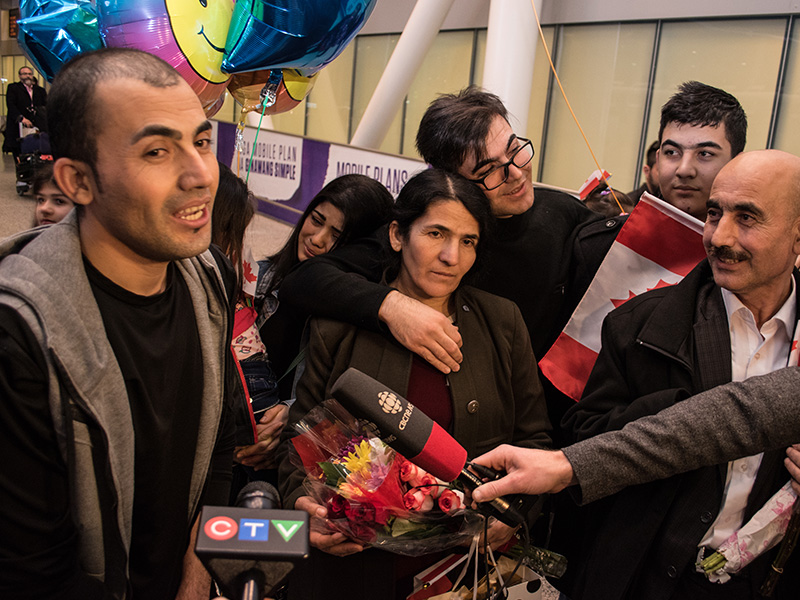Saadi Mado is all too familiar with the plight of Yazidis in their ancient homeland in Iraq and the wider Middle East where they have sought refuge.
A native of Mosul, Mado left his homeland ahead of Islamic extremists, who have turned the country into a charnel house for Yazidis, raping, murdering and kidnapping members of the people who trace their history in the region back thousands of years.
Mado found refuge of a sort in Turkey before moving to Canada nearly two years ago, and on Jan. 25, he welcomed seven of his family members, including his parents, to Canada. The seven arrived in Toronto from Turkey as part of Project Abraham, an effort co-sponsored by the Mozuud Freedom Foundation and Yazidi Human Rights International (YHRI) to bring Yazidis out of harm to freedom.
READ: ORGANIZATION FUNDS TO SPONSOR YAZIDI REFUGEES
The program was named for the patriarch Abraham, who also “came out of Iraq,” said project co-ordinator Debbie Rose, and many of the people who donated money to the project and volunteered their time to make it a success are Jewish.
The Yazidis, people who trace their lineage back thousands of years, “were killed, a lot were enslaved, young boys were kidnapped to become front-line soldiers” for ISIS, she said. It’s the 74th genocide the Yazidis have experienced through their history.
“It’s very reminiscent of what Jews have gone through,” she added.
Mado’s family is the first of five Yazidi families in the private sponsorship pipeline, said Geoffrey Clarfield, Mozuud’s executive director.
Altogether, Mozuud and YHRI hope to bring as many as 50 people to safety in Canada while reuniting them with family members already in the country. To date, the organization has raised $100,000 for the effort, he said.
Clarfield compared the Yazidis to Jews living under the Nazis. “It’s 1939 and you’re working with German Jews. They’re worried to death about their families,” he said.
READ: CONFRONTING GENOCIDE IN OUR TIMES
Clarfield said he’d like to see more Jews get involved in the rescue effort.
“Our hope is that the leadership of Canadian Jewish community… would speak as one voice… because from a Jewish point of view, the only ethnic group without any anti-Jewish bias and are pro-Israel are the Yazidis,” he said.
Members of Holy Blossom Temple have agreed to sponsor two Yazidi families and have raised more than $60,000 to support them, said Jacqueline Friedland, co-ordinator of the synagogue’s refugee efforts.
One is a family of five living in Turkey. The second is a single woman still in Iraq. The synagogue has also approached Jewish Immigrant Aid Services (JIAS) requesting that the agency find a third Yazidi family for sponsorship, Friedland added.
Rose said Project Abraham is working in conjunction with the office of refugees for the Catholic Archdiocese of Toronto, which, as a government-named sponsorship agreement holder (SAH), has received government approval to sponsor refugees and provide settlement services once they are in Canada.
Project Abraham had previously approached JIAS, which is also an SAH, but at the time, the agency had reached its maximum capacity to handle additional cases, said Lia Kisel, language and settlement director at JIAS.
In 2015 and 2016, JIAS facilitated the entry of 40 Syrian families with about 140 people, most of them sponsored by members of the Jewish community, she said.
There was no government-imposed cap on the number of Syrians permitted into the country, and according to government statistics, 39,671 Syrians have been brought to Canada, of which nearly 14,000 were privately sponsored refugees.
The federal government is slated to announce its policy on Yazidi resettlement by Feb. 22.
Currently, JIAS has submitted an application to bring one Yazidi family to Canada and perhaps one or two more later in the year, when the organization’s SAH government-mandated allocation is set, Kisel said.
As for Mado, he’s grateful he has found refuge in Canada. “It is a very good country. They gave us our freedom. They gave us our right to study again. They gave us our right to work. We really enjoy it here. It is very different than our country.”
